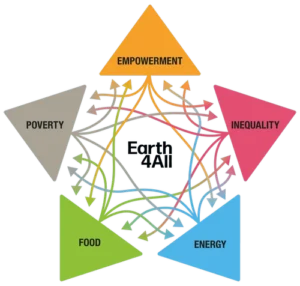
Paul and Anne Howland Ehrlich’s 1968 book The Population Bomb had a strong impact on global discussions about how to manage the Earth’s resources for a rapidly growing population. The book outlined the potential ecological disasters that would occur within a few decades, should measures not be taken to restrict population growth before it completely outstripped agricultural production and resource availability. The Population Bomb has since received deserved criticism for its dire alarmism, its proposal of inhumane ideas such as eliminating food aid to countries that do not act to suppress birth rates, and its eugenicist undertones of forced sterilization and similar draconian measures. Nonetheless, the book sparked a new global awareness of how the challenges of resource allocation might determine the course of the future.
Climate change threatens especially developing nations in the Global South, which are especially hard-hit by agricultural disruption from drought and desertification, land loss to sea level rise, and more frequent powerful storm events. As these developing nations suffer new catastrophes while infrastructure to deal with them is still being created, global inequality grows ever more stark. A new report from the international initiative Earth4All suggests that the key to addressing these problems lies not in population control, but in addressing global inequality. Funded by the global think tank The Club of Rome, Earth4All champions a necessary revolution in the way world economies operate, focusing on five turnarounds that societies can make in the next ten years to close the gap between the richest and poorest, limit the effects of climate change, and empower people across the world.

Those five turnarounds are: poverty (lifting the very poorest people out of poverty and helping them stay out of it), inequality (reducing the titanic gap between the richest fraction of humanity and the rest), energy (transitioning to renewable green energy sources and reducing overall energy consumption), food (creating stable food systems and ensuring equitable access to healthy, nutritious food for all), and empowerment (empowering traditionally disadvantaged people, especially women, to make changes in their lives and communities). The Earth4All report projects that, if we remain on our current trajectory, world population will reach 9 billion by the middle of this century, global average temperature change will surpass 2.5 degrees Celsius, and economic inequality will increase.
By contrast, if decisive action is taken in the next ten years, world population will peak at 8.5 billion and then begin to decline. Global climate change can be halted below 2 degrees C, which will avoid triggering several critical tipping points in sea level rise, polar melting, and other natural systems. By 2060, most low-income countries will have GDP of $15,000 per person or greater, sufficient to satisfy UN Sustainable Goals for human wellbeing. Achieving this brighter future will require swift action by world governments to address inequality, empower women, and reform our food, energy, and economic systems. Population growth is only one symptom of larger inequalities, and when those are addressed, population will stabilize at a sustainable level. Are we up to the challenge? Achieving this goal will require decisive action by world governments now – not later. As concerned citizens who love our planet and want to speak for the living treasures around us, we can tip the scales by telling our elected officials that we expect them to take bold action to build a brighter future for all.
